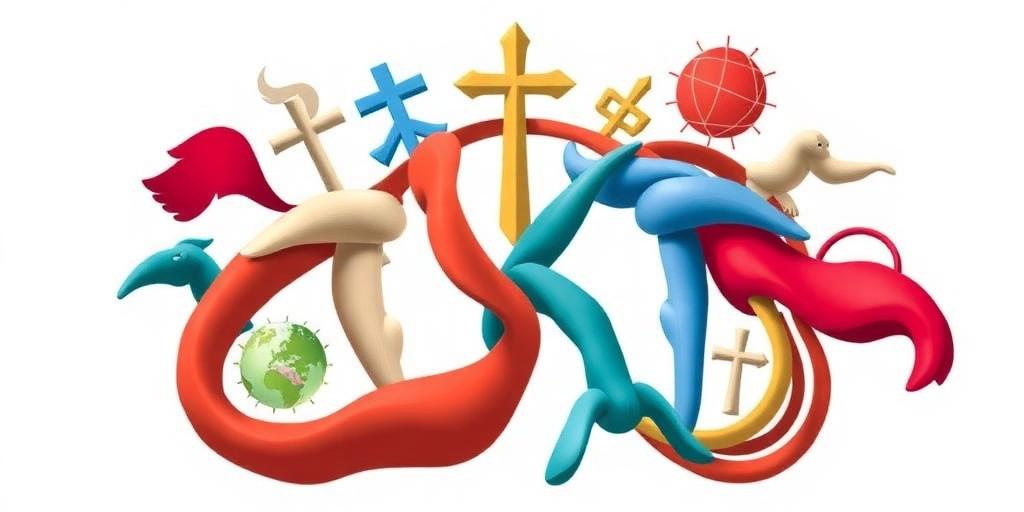The Role of Religion in Conflict and Reconciliation
Religion, a multifaceted phenomenon encompassing beliefs, practices, and communities centered around the sacred, has played a complex and often paradoxical role in human history. While frequently associated with peace, compassion, and ethical guidance, religion has also been implicated in conflict, division, and violence. Understanding this duality requires a nuanced examination of the ways in which religious beliefs and institutions interact with social, political, and economic forces.
Religion as a Source of Conflict
Throughout history, religious differences have served as a potent source of conflict. These conflicts often arise from:
- Doctrinal Disputes: Divergent interpretations of religious texts and theological principles can lead to profound disagreements and sectarian violence. The historical clashes between different Christian denominations, as well as the Sunni-Shia divide in Islam, exemplify this dynamic.
- Exclusivist Claims: Religions that assert their unique access to truth and salvation can foster intolerance and hostility towards other belief systems. Such exclusivist claims can be exploited to justify discrimination, persecution, and even warfare against those deemed "infidels" or "heretics."
- Religious Nationalism: The fusion of religious identity with national identity can create a particularly volatile form of conflict. Religious nationalism often involves the sacralization of national territory and the demonization of rival nations or ethnic groups. Examples include the conflicts in Northern Ireland and the former Yugoslavia.
- Competition for Resources and Power: Religious institutions and leaders often wield significant social, economic, and political power. Competition for these resources can exacerbate existing tensions and contribute to violent conflict. The Crusades, for instance, were motivated in part by the desire to control holy sites and expand Christian influence.
Religion as a Force for Reconciliation
Despite its potential for conflict, religion also possesses a remarkable capacity for promoting reconciliation and peacebuilding. This positive role stems from:
- Shared Values: Many religions share fundamental values such as compassion, forgiveness, and the sanctity of human life. These shared values can provide a basis for dialogue, cooperation, and the resolution of conflicts.
- Moral Authority: Religious leaders and institutions often command considerable moral authority within their communities. This authority can be used to condemn violence, promote reconciliation, and mediate between conflicting parties. Figures like Archbishop Desmond Tutu in South Africa and Mahatma Gandhi in India exemplify the power of religious leaders to mobilize nonviolent resistance and advocate for social justice.
- Community Building: Religious communities can provide a sense of belonging, identity, and mutual support. These communities can serve as vital social networks that promote trust, cooperation, and reconciliation, particularly in post-conflict societies.
- Rituals of Reconciliation: Many religions have developed rituals and practices specifically designed to promote healing and reconciliation. These rituals often involve confession, repentance, forgiveness, and acts of restorative justice. Examples include the Truth and Reconciliation Commission in South Africa and various interfaith dialogue initiatives around the world.
Case Studies
- South Africa: The Truth and Reconciliation Commission, led by Archbishop Desmond Tutu, played a crucial role in healing the wounds of apartheid. The commission provided a platform for victims and perpetrators to share their stories, fostering a process of truth-telling, forgiveness, and reconciliation.
- Northern Ireland: Religious leaders from both Protestant and Catholic traditions have worked tirelessly to promote dialogue, understanding, and cooperation. Initiatives such as the Corrymeela Community have provided spaces for people from different backgrounds to come together, build relationships, and challenge sectarianism.
- Rwanda: Following the genocide in 1994, religious communities have played a vital role in rebuilding trust and promoting reconciliation. Churches and mosques have provided support to survivors, facilitated dialogue between victims and perpetrators, and advocated for justice and healing.
Conclusion
The role of religion in conflict and reconciliation is complex and multifaceted. While religious differences can be a source of division and violence, religious values and institutions can also be powerful forces for peacebuilding and reconciliation. Understanding this duality requires a nuanced approach that recognizes the potential for both good and ill within religious traditions. By promoting interfaith dialogue, fostering shared values, and supporting religious leaders committed to peace, we can harness the power of religion to build a more just and harmonious world. Long-tail keywords to consider are: (1) religion and peacebuilding strategies, (2) interfaith dialogue for conflict resolution, (3) religious nationalism and its impact, (4) the role of religious leaders in reconciliation, and (5) ethical considerations in religious conflicts.









